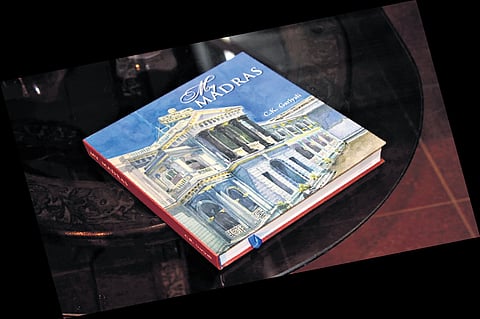

CHENNAI: This book is my tribute to the city which gave me asylum when my own home of 5,000 years in Srinagar in Kashmir was lost. If the civilisation and culture of Srinagar is 5,000 years old, the culture of Mylapore in Madras, where I live, is also thousands of years old,” writes CK Gariyali, retired IAS officer, in her recent book, ‘My Madras’. Published by Saraswathi Educational Cultural and Charitable Trust, the book is an ode to Madras, now Chennai. This city embraced the author early on and shaped her professional journey.
Birth of the book
Gariyali’s journey with Madras began in 1973 when she arrived as an assistant collector in Tamil Nadu. Hailing from Kashmir, Gariyali found herself in an unfamiliar city, where her experiences spanned fifty years. Her career took her through the corridors of power, from Fort St George to Raj Bhavan, connecting her with Madras’s institutions and culture. Gariyali shares, “Established in 1688, the city of Madras is the second oldest corporation in the world, after London.”
The book began as a personal reflection on her long-standing association with the city. It gradually transformed into a comprehensive history, highlighting Madras’s journey from its colonial past to its modern-day avatar. Her roles as secretary to the governor, director of culture, and collector of Madras district gave her a unique perspective on the city’s evolution. She was entrusted with some of its most iconic institutions — the Madras Museum, Connemara Library, and Madras Music College. “It so happened that I was posted in all these places, and I gained a lot of knowledge about the historical aspect of Chennai,” she says.
Documenting legacy
Gariyali dives into Madras’s rich history, beginning with its earliest days as a fishing port, Royapuram, and continuing to its establishment as the stronghold of the East India Company. She weaves stories of British colonialism, local Tamil traditions, and the cultural intersections defining Madras. Her time at the Tamil Nadu Archives and the Madras Record Office further enriched her understanding of the city’s history. She says, “I used all my old diaries, old photographs, everything I had for 50 years.” Although the actual writing process spanned about a year and a half, her personal archives made the task manageable.
From Fort St George to Rajaji Hall, the author discusses how they reflect the city’s British and pre-British history. She dives into the culture of Mylapore, one of the city’s oldest neighbourhoods, with its ancient Kapaleeshwarar Temple and rich religious traditions that rival the history of her homeland, Kashmir. She also explores Madras’s educational institutions — Presidency College, Madras University, and Queen Mary’s College — which she had the opportunity to oversee as a government official She writes about the Margazhi Music festival, the beaches of Chennai and statues of national icons.
The author also recounts a fascinating story about the Kapaleeshwarar Temple tank, underscoring the Nawab of Arcot’s religious harmony in Chennai. Gariyali writes, “Initially, the temple did not have a tank. The present temple tank belonged to Muhammad Ali Wallajah, the Nawab of Arcot.
It is said that a delegation of priests and devotees met the Nawab and impressed upon him the need for the ancient temple to have a tank.” In an act of goodwill, the Nawab agreed to gift the tank to the temple, with one important condition: “The Shia Muslims would continue to use it on the day of Muharram.” Since then, this unique tradition of shared religious space has continued, where the “panjas are immersed in the temple tank after the conclusion of the Muharram procession.”
‘My Madras’ was released during the celebrations of Madras Month, in August, a time when the city commemorates its 385-year-old legacy. Expressing her love for the people of the city, she says, “I love the people of Chennai because they are very progressive, but they are also very religious, god-fearing, honest, and hardworking. The youth is wanting to compete with the world, and women are empowered.”
The book is also an account of gratitude for Gariyali. “Kashmir is something which I lost, but Chennai is something which I gained. I wanted to give something back to the city,” she concludes.